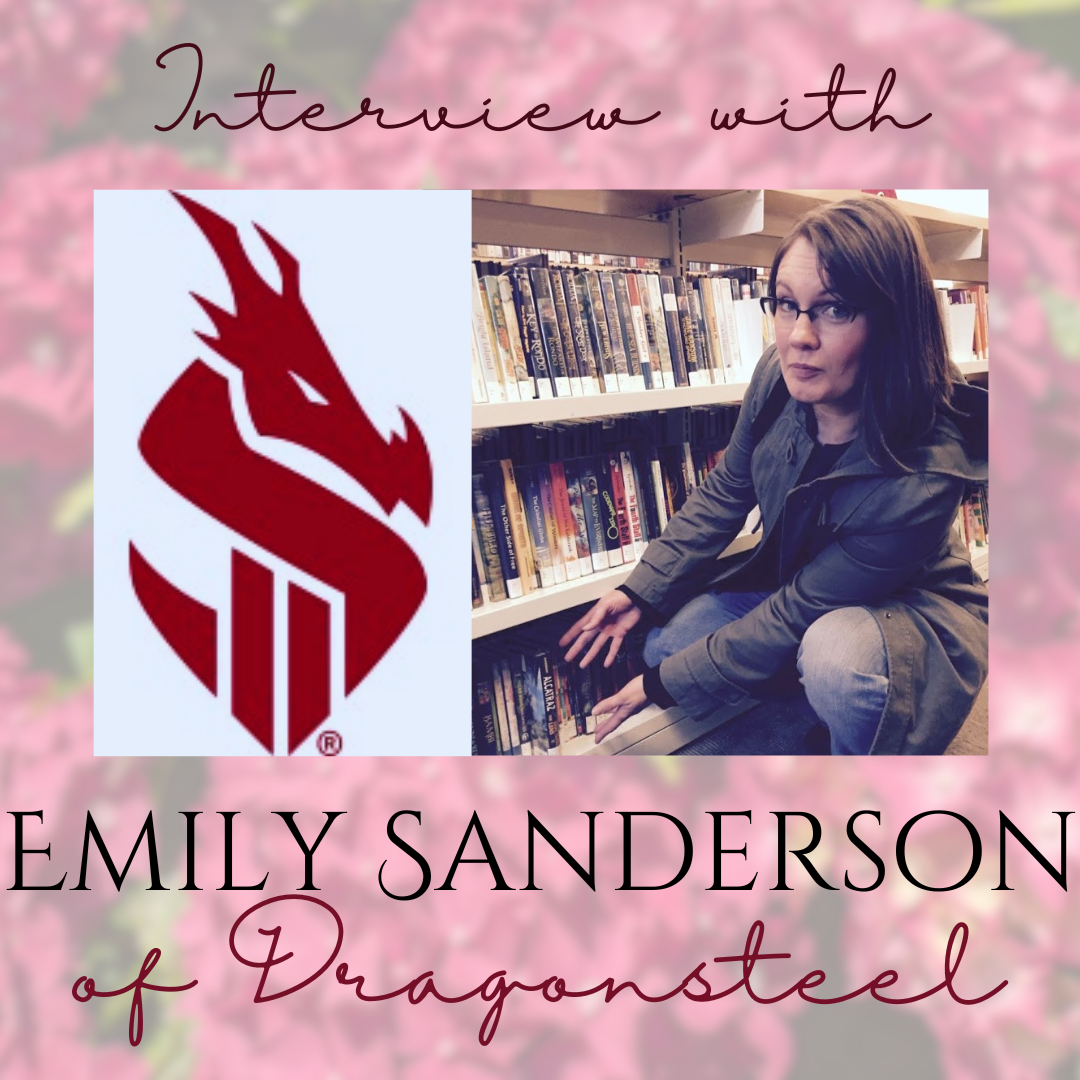Last February I was on a panel at LTUE Symposium about the care of nonwriting spouses. And…I honestly hope the recording of that panel never makes its way to YouTube because it was rough. A panel of four writers moderated by another writer means there was lots of information about how nonwriting spouses support writers, but not the other way around. We just didn’t have that perspective. Apart from sharing how influential Eve Rodsky’s book, Fair Play, has been for me and my marriage, I’m not sure I contributed anything helpful to the conversation.
So the next day, when I met Emily Sanderson, who is co-president of Dragonsteel Entertainment, a nonwriter, and very much cared by her husband, Brandon, who is one of the biggest fantasy writers out there, I asked her all the questions that I wished our panel had been able to cover.
Emily had such helpful insights that I asked her if she’d be willing to do an interview for my newsletter and blog. She was kind enough to say yes. I hope you enjoy!

Amy: What is it about the non-writing/writing spouse relationship that necessitates some extra care and attention? Why is this an important topic for all writers, partnered or not, to consider?
Emily: I think one reason is that writing is by nature a very solitary and subsuming activity. If you are not careful, it is easy for the writer to ignore family and friends to the detriment of those relationships.
Amy: When and how did you discover that Brandon was not just a writer, but a Writer *, and how did this initially impact your relationship?
*15 time NYT Bestseller, Hugo Award Winner, David Gemmel Legend Award winner, Romantic Times Reviewers’ Choice Award winner, Audible’s most pre-ordered book of all time, biggest Kickstarter campaign of all time, I’m running out of room here to list all the awards, accomplishments, superlatives, etc.
Emily: Brandon and I met in November of 2005 when we were set up on a blind date by a mutual friend. Elantris, Brandon’s first book, had come out in May of 2005, although Brandon had been writing seriously and trying to get published for ten years before that, so he had considered himself a “real” writer for a long time. On our date he kept referring to his agent and his editor and his writing…but I was skeptical…until I read Elantris. I’ve been an avid fantasy reader practically my entire life, so I immediately recognized Brandon’s talent when I saw it.
Amy: What is some of the labor, invisible or visible, that comes with being partnered with a writer?
Emily: It is hard for me to know how much of my experience can be generalized to all writers, and how much just pertains to me and Brandon. For me, it was necessary to learn to be okay with doing a lot of things independently. Brandon doesn’t do some things, such as parent-teacher-conferences or grocery shopping, or communicating with people about utilities. Some of that is because of his notoriety, of which not all writers have the privilege. Some of it is because writing does take so much brain space and time. We’d rather Brandon makes an effort to do important things like interact with our children, but we make a choice for me to do some of the less important tasks because we’d rather he spend his time writing.

Amy: Author Kate Atkinson has said, “I’d be happy, once I start a book, to lock the door, never speak to anyone, wear the same clothes and eat the same food. And I know I’m not alone in this because I’ve heard other people say it.” What boundaries or systems has Team Sanderson created to make sure no one is neglected and no one suffers during the writing process?
Emily: The biggest thing is that Brandon has made a concerted effort to compartmentalize his time. I know that at 5:30, he will stop writing, and focus completely on family for the evening. He also knows that I will do everything possible to NOT interrupt his scheduled writing time. If I do have to interrupt, he knows it is both important and urgent, and he’ll respond quickly, and without being annoyed. Clear communication on this subject has been really important. It is also important to have ongoing communication about this, since things change. If we both are aware of what the other person, and our children, are doing over the week, we can know where to prioritize our time. Because Brandon worked in our bedroom for so long, and I couldn’t just not go in there all day, I had to learn “the look” Brandon gets when he is in the zone, and know not to interrupt him. We made a deal that I wouldn’t say anything to him when I walked past, and that if he was in a place where he could be interrupted, he’d say something to me, so I’d know it was okay to chat with him for a bit. I do remember a couple of times when our kids were little and I got to a point where I couldn’t handle ANY MORE.! I went into the bedroom, climbed in bed with my clothes and shoes on, pulled the quilt over my head and just stayed there. Brandon took one look at me, slowly closed his computer, and went out of the room to deal with the children.
Amy: I’ve read that in the early days, when Dragonsteel was still a dream, you supported your husband’s writing with your teaching career. How did Brandon care for and support you during this time? What are some of the ways that he cares for you now?
Emily: There was really only one year where my teaching career supported us before Brandon made enough at writing for me to quit. Now, I was earning less than 30k a year at that point, so it wasn’t a high bar! Mostly, I remember Brandon teasing me when I had to get up before 6:00 AM by saying “Good bye, love! Have a nice day at work,” and then rolling over with an exaggerated self satisfied smile to go back to sleep. Brandon still teases me, but also cares for me the same way now that he did back then. He makes sure that my work and hobbies and interests get equal weight to his. He often encourages me to spend time with my sisters or friends. He asks me about what I am reading or watching or thinking about. Many times when I’ve been completely absorbed in a book, Brandon has taken over cooking dinner, or intercepted the kids so they don’t interrupt me, or things like that.
Amy: You are co-president and Queen of Dragonsteel Entertainment, and there’s a lot more to your business than Brandon’s writing. You have a team of over 50 people. You have merchandise, produce podcasts, host an annual convention, and so much more. In 2024 Dragonsteel won the Utah Business Leaders of the Year Award. Y’all are busy! How do you make sure that your relationship isn’t consumed by work, your business, and Brandon’s writing?
Emily: It isn’t easy! Sometimes we are better at it than others. One thing Brandon and I have done is to have a weekly date night. Sometimes we go out, sometimes we stay in, but one evening a week we do something fun together. We don’t prohibit ourselves from talking about work on date night, because that is fun to us, but we do try to focus on doing other things together as well.

Amy: What is an undervalued aspect that you love about your business, Dragonsteel?
Emily: I really like working with some of my good friends and family members. Business owners are always cautioned against hiring friends and family, but I think it can be a good thing in some cases. We started Dragonsteel, in part, to make good jobs for people. Why not give those good jobs to people we already know and love and feel a responsibility to care for? (As long as they are qualified for said jobs, of course.) It can definitely make things more complicated, and you have to have good communication and very clear boundaries, but I’ve found that many people, especially those that have any degree of fame, turn to family and close friends to help them, and I really enjoy being able to work with my friends and family members every day.
Amy: Lots of writers have day jobs and spend their leisure time writing. Things can get messy when the passion project becomes the profession. How does Team Sanderson approach leisure and vacations? Are there ever moratoriums on writing and work?
Emily: Actually, we often mix business trips with vacations. We have found that it works better if we separate the two, doing the business stuff first, and then staying a few extra days for sight seeing or vacation. It is hard to put a moratorium on writing during vacation time, because writing is what Brandon loves to do. He just writes different things during his vacation time than during his work time. We try to make time for family during the trips, just like we do at home, by having specific hours for family, and specific hours for work, but I don’t think we’ve ever had a vacation where there hasn’t been some kind of work involved. That is what you get for owning your own business, and doing a job you love.

Amy: If you could time travel back to Baby Emily and Baby Brandon on their wedding day and leave them a gift, what would it be?
Emily: I would give them the names of some good mentors, and the financial means to pay for consultations. We blundered around a lot when first starting our business because we just didn’t know what questions to ask. Finding someone who is doing what you want to do, and asking them what pitfalls you should avoid is something everyone should try to do early and often.
Thank you so much, Emily, for sharing your insights with us! This interview was first shared to my newsletter at the beginning of this month. If you enjoyed it and like early access, please consider subscribing.


